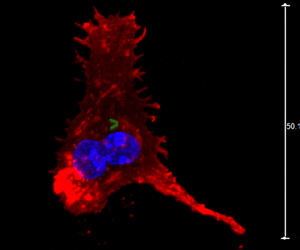BCG Vaccine: Difference between revisions
No edit summary |
No edit summary |
||
| Line 1: | Line 1: | ||
==Introduction== | ==Introduction== | ||
Bacille Calmette Guerin (BCG) is the most common vaccine administered to combat tuberculosis disease in the world. (1) The vaccine contains a weakened live strain of Mycobacterium bovis (2), which is present in cows and shares a common ancestor with the human tubercule bacillus Mycobacterium tuberculosis (3). Similar to other vaccines, BCG induces the formation of antibodies from the harmless strain of Myobacterium bovis to help prevent tuberculosis (4). Although BCG remains as the primary vaccine against tuberculosis, it has only produced variable amounts of success. Additionally, the emergence of mycobacterial drug resistance has further jeopardized the effectiveness of BCG (5). Researchers are currently searching for a more effective way to treat tuberculosis disease, but no successful vaccine is expected for twenty years (1).<br><br> | |||
Compose a title for your page. Type your exact title in the Search window, then press Go. The MicrobeWiki will invite you to create a new page with this title.<br><br> | Compose a title for your page. Type your exact title in the Search window, then press Go. The MicrobeWiki will invite you to create a new page with this title.<br><br> | ||
Open the class template page in "edit." Copy ALL the editable text. Then go to YOUR OWN page; edit tab. PASTE into your own page, and edit.<br><br> | Open the class template page in "edit." Copy ALL the editable text. Then go to YOUR OWN page; edit tab. PASTE into your own page, and edit.<br><br> | ||
Revision as of 01:57, 8 November 2013
Introduction
Bacille Calmette Guerin (BCG) is the most common vaccine administered to combat tuberculosis disease in the world. (1) The vaccine contains a weakened live strain of Mycobacterium bovis (2), which is present in cows and shares a common ancestor with the human tubercule bacillus Mycobacterium tuberculosis (3). Similar to other vaccines, BCG induces the formation of antibodies from the harmless strain of Myobacterium bovis to help prevent tuberculosis (4). Although BCG remains as the primary vaccine against tuberculosis, it has only produced variable amounts of success. Additionally, the emergence of mycobacterial drug resistance has further jeopardized the effectiveness of BCG (5). Researchers are currently searching for a more effective way to treat tuberculosis disease, but no successful vaccine is expected for twenty years (1).
Compose a title for your page. Type your exact title in the Search window, then press Go. The MicrobeWiki will invite you to create a new page with this title.
Open the class template page in "edit." Copy ALL the editable text. Then go to YOUR OWN page; edit tab. PASTE into your own page, and edit.
At right is a sample image insertion. It works for any image uploaded anywhere to MicrobeWiki. The insertion code consists of:
Double brackets: [[
Filename: PHIL_1181_lores.jpg
Thumbnail status: |thumb|
Pixel size: |300px|
Placement on page: |right|
Legend/credit: Electron micrograph of the Ebola Zaire virus. This was the first photo ever taken of the virus, on 10/13/1976. By Dr. F.A. Murphy, now at U.C. Davis, then at the CDC.
Closed double brackets: ]]
Other examples:
Bold
Italic
Subscript: H2O
Superscript: Fe3+

